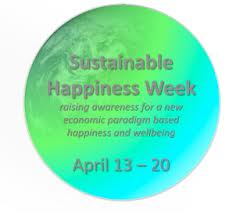A Week of Happiness: Prioritizing Well-being for Our World
Apr 17th, 2013 | By admin | Category: Economics and GDPBy Suzanne York, www.howmany.org
As you recover from the stress of filing taxes, you can take some relief and pleasure in this being Sustainable Happiness Week. It kicked off on April 13th, and runs through April 20th.
Where is it easiest to feel happy? Check out this infographic from Sustainable Cities Collective to see the Top Ten Happiest Cities in the World. Rio de Janeiro, with its beautiful scenery and Carnival, is listed as number one.
Why a week devoted to sustainable happiness? Perhaps because more Americans report having less satisfaction in their lives. According to a February 2013 Gallup Poll, the United States has shown almost no improvement in well-being in the past five years. Other studies have found that American workers put in long hours and take fewer vacations than citizens of other countries.
There is growing awareness of decreasing levels of happiness, life satisfaction, and well-being in much of modern society. Simply put, it’s fairly obvious today that money, technology and unsustainable economic growth do not equal happiness, nor does it make for a healthy planet (more on happiness and economics can be read here and here).
The big step to take is to rethink how we define economic growth, and making human and environmental well-being part of new economic indicators. The current measurement – Gross Domestic Product, or GDP, counts the good and the bad and isn’t a sufficient indicator of society or environmental well-being in this time of climate change and economic and social injustice.
The United Nations, academics, world leaders, and many others are working to change for the better how we measure our economy and lives. The government of Bhutan has been leading the charge on this for decades, with its Gross National Happiness indicator, which today is being taken seriously around the world.
In 2011, the UN unanimously adopted a resolution based on the concept of Gross National Happiness. Leaders from many different sectors weighed in. Officially called UN Resolution 65/309 “Happiness: towards a holistic approach to development”, it recognizes the pursuit of happiness as a fundamental human goal and that GDP does not adequately reflect happiness and well-being.
Smaller organizations are also taking up the call of building happier societies. In Seattle, Washington, the Happiness Initiative is an organization with a mission “to work for a just, healthy and resilient society where all people have the opportunity to pursue happiness”. Part of their work includes a survey on well-being that is now being used in many communities. According to this same organization, cities and universities in Brazil have launched happiness campaigns, as well as the city of Victoria, BC.
One of the main purposes of having an official week of sustainable happiness is to overcome society’s predilection for overconsumption. And while many people are consuming unsustainably, others are unable to even get enough to eat. For the sake of the natural world and the health of communities, a change toward less consumption is needed.
Sustainable Happiness Week is a good time to highlight many of the great initiatives being taken around the world. Some are big, some are small. But we can celebrate and support steps in the right direction, and share with others, including:
-
The Transition Town movement;
-
Alternative indicators such as the Happy Planet Index;
-
The Happiness Initiative’s Happiness Toolkit;
-
Community rights and empowerment movement;
-
Slow Food networks;
As many Americans begin to celebrate Earth Day this weekend, the consumption piece needs to be part of how we can improve the environment, simply by putting less pressure on it. We live in a world of finite resources but act otherwise, and convince ourselves we are happy when it’s obvious many of us are not. When we put in place indicators that reflect this, and implement policies that move us toward greater well-being and a sustainable world, then we will be making progress.
In the meantime, enjoy the rest of Sustainable Happiness Week!
Suzanne York is Senior Writer with the Institute for Population Studies.


